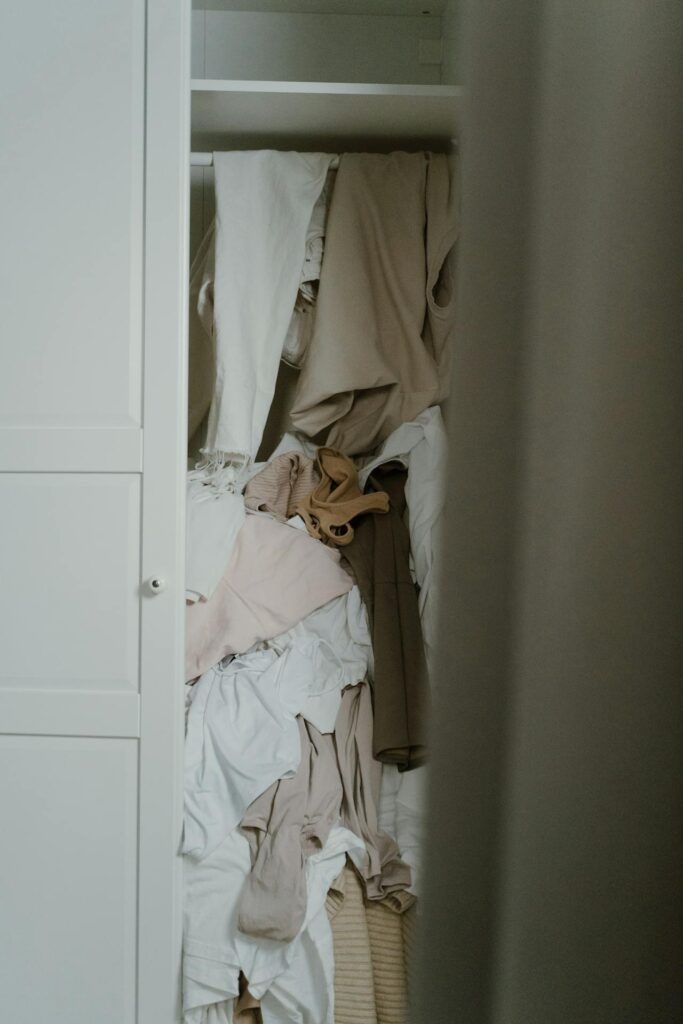
Join 130k subscribers and get the best of the week, straight to your inbox.
“Why can’t relax until the house is house is clean?” This is a question I see so many women asking in an online community I recently joined. In fact, I have also been one of those moms with this exact question until I learned the why. I was constantly stressed, anxious, and would find myself frustrated if my house wasn’t clean.
Diagnosed or undiagnosed, OCD is not the same as being obsessed with cleaning and organizing. Because some of us simply like things to be in order so our life isn’t disturbed by mess and clutter.
Many of us feel that an untidy house can crank up the stress levels big time. It’s like the mess has a direct line to your anxiety button, which makes it tough to relax or focus on anything else. And this isn’t about being obsessive, it’s a genuine unease that comes when your space feels out of control.
Many people don’t visit friends that often because they find their house is dirty, others feel uneasy when the guests are over, and so on—without knowing why and how to fix it.
If you’re also wondering why I can’t relax until the house is clean and want to know how to stop cleaning so much, I hear you. In this post, I’m going to explain why we feel the urge to clean and how to get rid of it. Let’s understand the problem and look at the solutions so that you don’t get ticked off when the shoes are not in their place or there’s pet hair on the carpet.
Why I Can’t Relax Until the House Is Clean? 3 Top Reasons
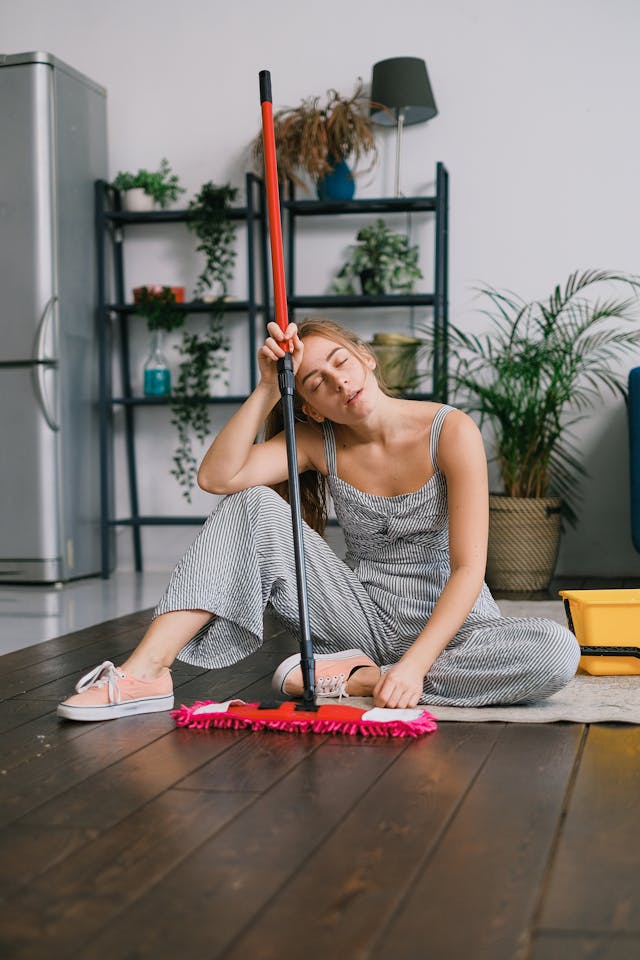
It’s an everyday scene for many of us: toys scattered, dishes piled up, and yet, despite a long day, having to settle down amid the chaos feels impossible.
As a stay-at-home working mom, I understand that urge to have a stay at home mom schedule that frees up plenty of me time because my mind can’t settle until my space does.
So before getting to a decluttering checklist, let’s first see why you feel can’t relax until the house is clean:
The Impact of Clutter on the Mind
Clutter crowds your brain and works like a constant background noise that makes it hard to focus. Research underlines this, showing that cleaner spaces promote lower stress levels and set the stage for your mind to relax and your focus to sharpen. For me, clearing out the day’s mess is akin to clearing a workspace before starting a new project, which gives me a fresh slate.
A study was conducted on two groups of young women who cared for infants in normal and cluttered environments. The aim was to see how differently they behave and respond. While their responsiveness wasn’t much different, these women’s physical stress levels were higher when they lived in a cluttered environment.
The Link Between Cleanliness and Control
During times when life throws its curveballs, maintaining a clean home can feel like a life raft that helps you keep a handle on things. Cleaning is proactive, which pats your need to be in control and have an order in at least something.
Some of us find solace in our daily routine and can’t relax until the house is clean, so doing it provides us with a sense of competence. According to a University of Connecticut study, people repeat their routines and behaviors like cleaning when they’re stressed because that gives them a sense of control.
Cultural and Personal Influences on Cleanliness
Ever thought that maybe the other person is not dirty or unorganized, just you are a neat freak? That’s because the cultural and familial contexts in which we were raised influence our cleaning habits.
For example, in my family, a clean and orderly home was considered a fundamental aspect of showing respect for oneself and one’s guests. So now when I see someone hasn’t put effort into setting a space for (expected) guests, it gives me an ick. However, the pressure to maintain these standards can translate into anxiety when our living spaces don’t meet the expected norms.
Understanding When Cleaning Becomes Stressful or Unhealthy
Maintaining a clean space is a great habit, but sometimes, the need for a spotless home goes beyond simple tidiness. If you can’t relax until the house is clean, it can be a sign of perfectionism or underlying anxiety. You may feel unsettled by even the smallest messes, or can’t relax until the house is clean. If that starts to happen, know that your cleaning habits are becoming unhealthy.
Not sure where to draw a line? Here are some signs that you’re obsessed with cleaning and organizing to the point you can’t relax until the house is clean:
- Feeling panicked over minor clutter. For instance, a few toys on the floor or dishes in the sink cause you stress.
- Inability to relax, like you can’t sit down or enjoy leisure time if there’s any cleaning left to do.
- Neglecting personal time and spending so much time cleaning that there’s little left for hobbies, friends, or self-care.
- You feel guilty if you’re not actively tidying up, even when it’s not needed.
- Believing that a clean house defines your value or success as a person.
Why Does Cleaning Calm My Anxiety? The Connection
As explained earlier, having a handle on things around you puts you in a place of control and makes your surroundings predictable. For instance, when you know that laundry is done and put away in relevant cabinets, you won’t be rambling through drawers in the morning before a school run. Therefore, many see regular cleaning and organizing as a way to get their life in order and with the least hurdles.
Loved this reflection?
Join The Now Edit — my weekly letter for women reimagining how they live, work, and show up in the world.
Soulful storytelling. Gentle Strategy. Real Tranformation.
By signing up, you’re agreeing with our terms and conditions.
A clean space reduces sensory overload as clutter can be visually overwhelming and make it hard to relax. If we can’t relax until the house is clean, we try to declutter our homes and minds at the same time—there’s less to do after a deep clean and less to think while you’re busy cleaning.
What is the Messy House Depression?
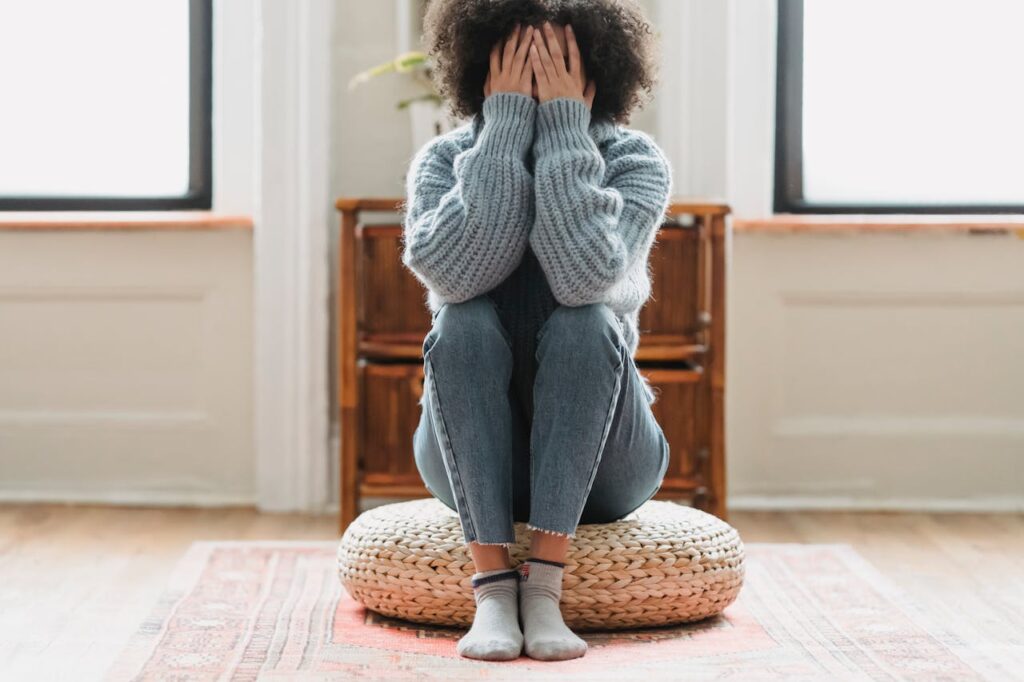
Messy house depression is the feeling of being overwhelmed and down due to a cluttered living space. When the mess piles up, it affects your mood and energy levels. You can even feel stuck, unmotivated, or hopeless about where to begin tidying up. Therefore, people with depression may find it extremely challenging to get up and clean even the easiest surfaces.
Even if they try doing it, they feel anxious and incapable, which results in the mess slowly piling up. This pattern can create a cycle where the mess contributes to feelings of depression, and the depression makes it harder to clean—which means more clutter.
What Causes Compulsive Decluttering?
I was once on a decluttering haul and threw out some important documents because I didn’t look at what was in the envelope. Lesson learned: don’t do compulsive decluttering.
Just like depression can push you to a dungeon of not cleaning, stress can trigger your OCD cleaning habits.
Owning–and having to manage–fewer items gives us control and when we don’t want to deal with too much, we go on a decluttering spree.
This behavior can stem from a desire to avoid clutter at all costs, which can also result in the disposal of items that are needed or cherished.
If you’re constantly getting rid of things and feel that it’s affecting your daily life or relationships, it’s time to explore why. Understanding the root causes can help you find a healthier balance between minimalism and holding onto valuable items.
What are the Obsessive Cleaning Disorder Symptoms?
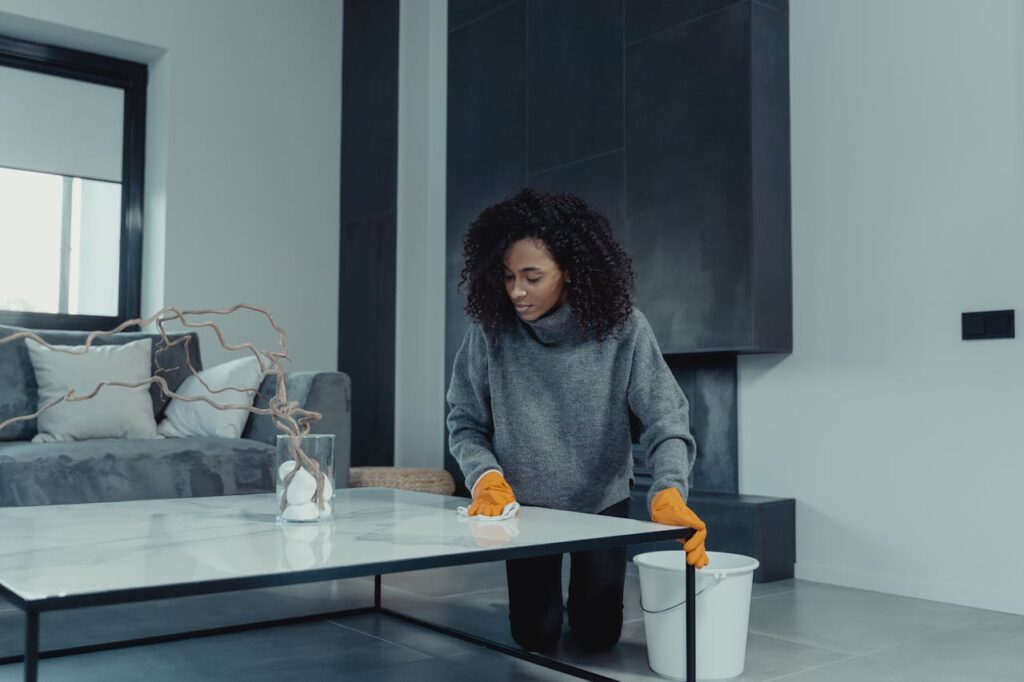
Why am I obsessed with cleaning my house? You may have undiagnosed OCD (Obsessive Compulsive Disorder).
An excessive urge to clean goes beyond enjoying a neat home, it includes unstoppable compulsions that interfere with your daily life. Some OCD symptoms are:
- Spending excessive time cleaning
- Feeling anxious if something is out of place
- Intrusive thoughts about germs or contamination
- Avoiding activities to keep the house clean
- Compulsively organizing
Note: Only a mental health professional can diagnose if you have OCD or you’re just a perfectionist about cleaning—don’t rely on the symptoms you read on the internet.
Also Read: Spring Family Photo Outfits
3 Strategies to Help Balance Cleanliness with Relaxation

You know you can’t relax until the house is clean but are tired and want to know how to stop cleaning so much—I get it. Here are some ways to balance cleanliness with relaxation so your space is neat and you aren’t burnt out:
Start Small
If you want to master how to stop obsessing over cleaning, don’t try to tackle the entire house in one swoop because that’s a fast track to burnout. Instead, focus on small areas and begin with a single room or just a cluttered corner.
Then allocate specific times for cleaning—like 15 minutes after dinner or an hour on the weekend. This way, cleaning tasks won’t spill over into all your time and breaking chores into manageable chunks will make them less overwhelming.
Practice the “Good Enough” Mindset
Things don’t have to be perfect at all times and there’s no medal you’re going to get for that. Let go of the idea that everything has to be perfect. Go by the rule that your home doesn’t need to look like a magazine and set realistic standards for cleanliness. Maybe the kids’ toys are still on the floor, but the kitchen is clean and that’s okay. Accepting a “good enough” mindset reduces stress and frees up time for you to unwind.
Create a Quick Tidy-Up Routine
Speed-cleaning techniques will make a big difference without eating up too much of your time. Here’s a quick routine to get over the ‘can’t relax until the house is clean’ problem:
- Pick Up Clutter: Spend minutes collecting items that are out of place and return them to where they belong.
- Wipe Down Surfaces: Then quickly clean countertops and tables in the kitchen and living areas.
- Handle Dishes Immediately: Try to wash dishes right after meals to prevent them from piling up. And also ask everyone to do their wishes so one person doesn’t have to do a lot.
- Organize High-Traffic Areas: Tidy up entryways and hallways where clutter usually accumulates.
- Prepare for Tomorrow: Lay out clothes or pack lunches to make the next day smoother.
How Often Should You Clean Things?
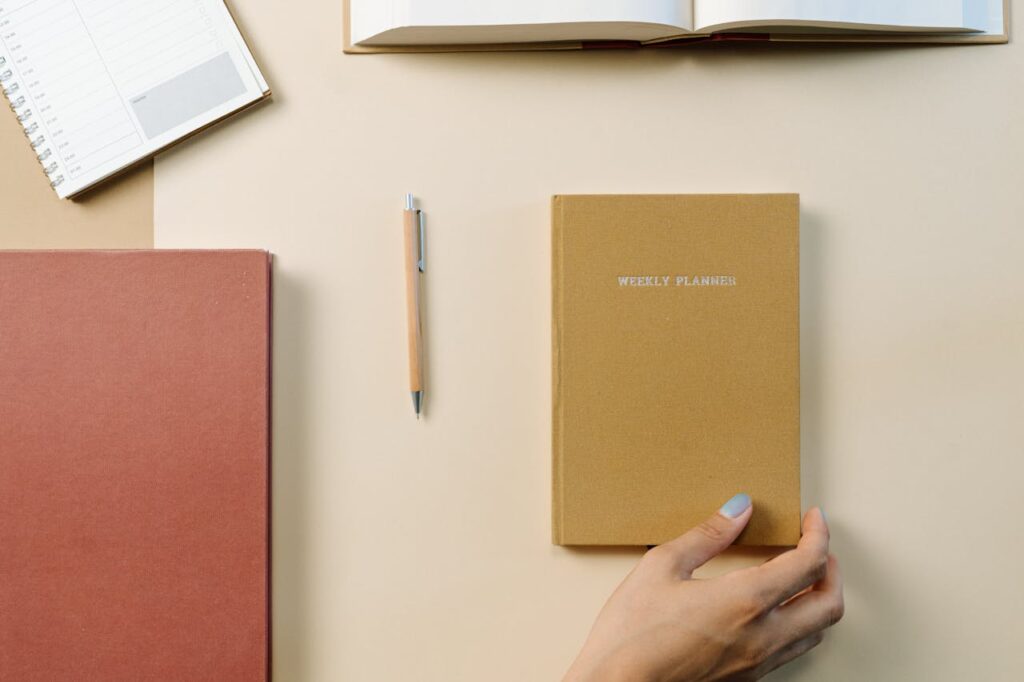
A doable cleaning schedule means that instead of letting chores pile up, you spread them throughout the week. Doing so makes sure that the house stays tidy without consuming all your free time.
Here are some Monday-to-Sunday best cleaning hacks for busy people you can test in your home:
Monday: Kitchen Refresh
- Wipe countertops and appliances
- Clean the sink and dispose of old food
- Sweep and mop the kitchen floor
Tuesday: Bathroom Care
- Clean toilets, sinks, and showers
- Wipe mirrors and replace towels
- Restock toiletries if needed
Wednesday: Living Area Tidy-Up
- Dust furniture and electronics
- Vacuum or sweep the floors
- Organize magazines, books, and remote controls
Thursday: Bedroom Maintenance
- Change bed linens and pillowcases
- Put away clothes and declutter surfaces
- Vacuum or sweep the bedroom floor
Friday: Entryway and Hallways
- Sweep or vacuum entryways and hallways
- Organize shoes, coats, and bags
- Wipe down door handles and light switches
Saturday: Laundry Day
- Wash, dry, and fold clothes
- Launder towels and bath mats
- Iron or steam garments as needed
Sunday: Rest and Reset
- Do a quick pick-up of stray items
- Plan meals and activities for the coming week
- Take time to relax and recharge
How to Reframe Cleanliness as a Form of Self-Care, Not an Obligation? 3 Practical Tips
If you can’t relax until the house is clean, one way to get over it is changing the way you see these chores. I used to view cleaning as just another item on my endless to-do list but shifting my perspective made it more manageable. Here’s how you can do it too:
Clean with Intention, Not Compulsion
Instead of cleaning because you feel you have to, try cleaning because you want to care for yourself and your space. Make it enjoyable by playing music or listening to a podcast. Set a time limit—like 20 minutes—and focus on one task or area. Following this tip turns cleaning into a purposeful activity rather than a never-ending duty.
Learn to Savor Relaxation Moments
Permit yourself to relax even if everything isn’t perfectly in place and create small rituals that help you unwind. It could be a cup of herbal tea, a few pages of a good book, or sitting quietly for a few minutes. Practicing relaxation in a space that isn’t spotless helps you build tolerance for minor messes and you realize that a few toys on the floor or dishes in the sink don’t have to steal your peace.
Practice Mindfulness in a Less-Than-Perfect Space
When you feel the urge to stress-clean, pause and take deep breaths. Then focus on the present moment without judgment and notice the comforts around you. Simple mindfulness exercises, like focusing on your breath or observing your environment, can reduce anxiety and help you accept that imperfection is okay.
Let Go of the Concept of the “Lazy Mom”
Many moms feel immense pressure to keep their homes immaculate and try to know how to maintain a clean home with kids. They believe that anything less than perfection is a sign of laziness. This “Lazy Mom” label is unfair and unrealistic for all mamas. Letting go of this concept means accepting that it’s normal for a home to look lived-in, and not a beige-themed magazine cover.
Recognizing that a bit of mess doesn’t define one’s worth can also end a lot of unnecessary stress. All moms should focus on what matters, which is spending quality time with loved ones and taking care of themselves instead of striving for an unattainable ideal of perfection.
Suggested Reads:
FAQs
What can trigger cleaning OCD?
Stress, anxiety, or major life changes can trigger cleaning OCD. When things feel out of control, some people turn to cleaning to regain a sense of order.
Why am I obsessed with feeling clean?
An obsession with feeling clean stems from a way to manage anxiety. You may find that maintaining cleanliness gives you a certain accomplishment or self-worth.
What is a cleaning obsession called?
A cleaning obsession is referred to as Obsessive-Compulsive Disorder (OCD) with a focus on cleanliness or contamination. This condition includes persistent thoughts about germs or dirt and results in repetitive cleaning behaviors.
Zakia Lott
More Like This:









2 Responses
It’s onerous to seek out knowledgeable individuals on this matter, but you sound like you already know what you’re talking about! Thanks
That’s very kind of you. I’m glad you’re enjoying the blog.